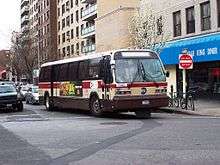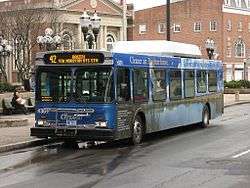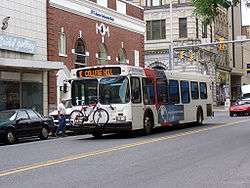Jamaica Buses

Jamaica Buses, Inc., also known as Jamaica Bus Lines[1] or the Jamaica Bus Company,[2] was a bus company in New York City, United States, operating local service in Queens and express service to Manhattan until January 30, 2006, when the MTA Bus Company took over its operations.
The president of Jamaica Buses, and GTJ Reit Inc. was the late Jerome Cooper (August 14, 1928 – May 20, 2015 (aged 86)).[3][4] Its facility was located on 114-15 Guy R. Brewer Boulevard in South Jamaica, Queens.
History
After the bankruptcy of the Long Island Electric Railway in 1926, the company's trolley lines in Nassau County were disestablished, however the ones in Queens survived, and the company was reorganized as the Jamaica Central Railways. This company would continue to operate streetcars for another six years. Upon reestablishment, the company purchased used trolley cars from companies such as the Empire State Railroad of Oswego, and the New York and Stamford Railway. Many of these cars dated back as far as 1911 and proved to be defective when used on the Far Rockaway Line. The conditions became so dangerous that by the Summer of 1930 the New York State Public Service Commission intervened and demanded that they trade the cars in for those from the Eastern Massachusetts Street Railway. Unfortunately, those cars proved to be inadequate, and that line was eventually abandoned. Cars on other lines inherited from the LIER did not suffer such misfortunes.
In 1930, the City of New York granted the company a bus franchise service named Jamaica Buses, a subsidiary of Jamaica Central Railways. Bus operation over all the former JCR trolley lines began on November 12, 1933; this coincided with the widening of Jamaica Avenue, and the removal of the trolley tracks on the former routes.[5][6] The company was acquired by the stockholders of Green Bus Lines in April 1949 after financial troubles.[1][5] In the 1970s the QM21 express route to Manhattan was initiated.
Bus routes
Just prior to MTA Bus takeover, Jamaica Buses operated on the following routes that are now based in Baisley Park Bus Depot, the former company facility.[7][8] All four local routes shared a northern terminal in Jamaica, Queens at the Parsons Boulevard subway station at Hillside Avenue.[9] Old route designations can also be found in the local routes.
| Route (Former) |
Terminal A | Major streets of travel | Terminal B | Notes |
|---|---|---|---|---|
| Queens Local | ||||
| Q110 (A)[5][10] |
Jamaica 88th Avenue and Parsons Boulevard at Parsons Boulevard ( E F trains) or 179th Street and Hillside Avenue at Jamaica – 179th Street ( E F trains) |
Jamaica Avenue, Hempstead Avenue | Elmont Belmont Park |
*Original Jamaica terminus was 168th Street station,[11] the former terminus of the surface line.[12] |
| Q111 (B)[5] |
Jamaica 88th Avenue and Parsons Boulevard at Parsons Boulevard ( E F trains) |
Guy R. Brewer Boulevard |
or
|
|
| Q112 (C)[5][10] |
South Road, Liberty Avenue | Ozone Park Rockaway Boulevard/98th Street at Rockaway Boulevard ( A train) |
*Original Jamaica terminus was 168th Street station on the BMT Jamaica Line.[11] | |
| Q113 (B); (D)[5][10] |
Guy R. Brewer Boulevard, Rockaway Boulevard, Central Avenue, Beach 9th Street |
Far Rockaway Seagirt Boulevard and Beach 20th Street |
| |
| Queens-Manhattan express | ||||
| QM21 | Gramercy Park | Manhattan: 23rd Street, Madison Avenue, 57th Street Queens: Queens Boulevard, Linden Boulevard, Guy R. Brewer Boulevard |
Rochdale Village Loop |
Manhattan Express[5] |
Also, between 1954-1995 Jamaica Buses Inc., provided a wide range of private CHARTER services earning extra income used to help subsidize the other Cooper family owned bus companies such as Green Bus Lines and Triboro Coach Corp.[14]
References
- 1 2 "70,000 Bus Riders Delayed By Strike: 3 Jamaica Lines Are Affected in Protest Against Alleged Reduction in Service". The New York Times. June 4, 1949. Retrieved 20 December 2015.
- ↑ "Harry P. Williams, Bus Line Head, Dies". The New York Times. March 15, 1941. Retrieved 20 December 2015.
- ↑ Jamaica Buses Incorporated (accessed January 19, 2007; archived June 4, 2015)
- ↑ Obituaries; Jerome Cooper (New York Times; May 21, 2015)
- 1 2 3 4 5 6 7 "Company Profile". Jamaica Buses, Inc. Archived from the original on 2006-01-25. Retrieved 13 October 2015.
- ↑ "Jamaica Buses To Inaugurate New Service: Ceremony Will Be Held Tomorrow in Opening Routes to Southeast". Brooklyn Daily Eagle. November 10, 1933. Retrieved 13 October 2015 – via Newspapers.com.
- ↑ "MTA Bus: Baisley Park Pick Glossary" (PDF). baisleyparkfamily.com. MTA Bus Company. June 28, 2015. Retrieved 29 October 2015.
- ↑ Jamaica Buses Incorporated (Internet Archive)
- ↑ Jamaica Buses, Inc. (April 24, 1937). "New Subway and Jamaica Buses: Service Effective 1 P.M. Saturday, April 24" (PDF). Long Island Daily Press. Fultonhistory.com. Retrieved 14 January 2016.
- 1 2 3 "Pick Tentative Bus Operators; Queens Objects: Board Selects North Shore and Jamaica Firms-Hearing July 10". Brooklyn Daily Eagle. June 19, 1931. p. 2. Retrieved 12 October 2015 – via Newspapers.com.
- 1 2 3 "Strike Ties Up 3 Queens Bus Lines: 138 Quit Work, Leaving 40,000 Riders Stranded". Brooklyn Daily Eagle. April 29, 1941. Retrieved 13 October 2015 – via Newspapers.com.
- ↑ New York Times, New Subway Line: Affords a Five-Cent Fare Between Manhattan and Jamaica, L.I., July 7, 1918, page 30
- ↑ "Bus Line Seeking Inwood Franchise". Brooklyn Daily Eagle. October 12, 1931. p. 19. Retrieved 13 October 2015 – via Newspapers.com.
- ↑ Martin, Guy E. (2005). NEW YORK CITY TRANSIT BUSES: 1945-1975 PHOTO ARCHIVE BOOK. Infographic Enthusiast Books. ISBN 978-1583881491.
External links
- NYCDOT - Privately Operated Bus Service (as of early-to-mid 2000s, accessed January 19, 2007)
- Jamaica Bus Photos (Bus:NYCSubway.org)
- Story of the Long Island Electric Railway and the Jamaica Central Railways, 1894-1933, Internet Archive




.jpg)
